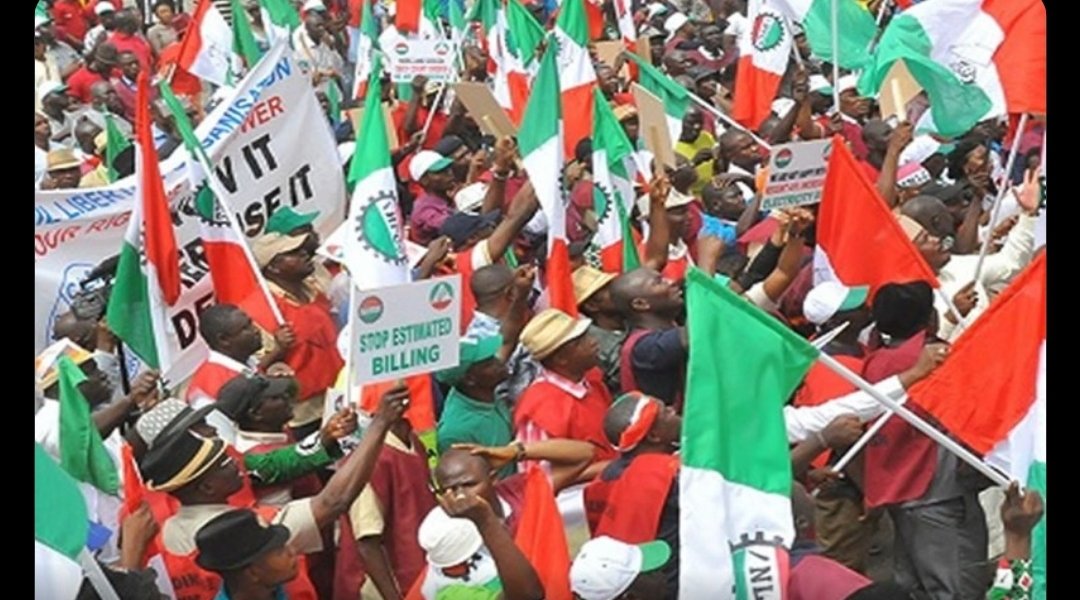
The incessant labour union strike, from the Academic Staff Union of Universities to the Nigeria Labour Congress, has become a regular staple in Nigeria’s litany of underdevelopment characteristics. And the industrial disputes usually result from labour unions’ reactions to what is perceived as government’s recurring insensitivity to the plight of workers in the dynamics of governance. The current labour action— a demand for a realistic minimum wage — is waged on the platform of the argument that government has the means of paying the new wage it proposed. The labour unions, in their arguments, try to justify their theory of government’s insensitivity on two planks. One, there are the widespread indices of poverty and suffering by Nigerians arising from the cost-of-living crisis and the evident loss of purchasing power. Two, there is also the hype around the whole issue of wastes and redundancies as well as political and bureaucratic corruption embedded in the costs of servicing the indulgences of some categories of government functionaries.
On the other hand, the government—and even the organised private sector—think the proposal of labour is unrealistic. And that argument is founded on a range of interconnected economic realities and dynamics, ranging from payroll cost as percentage of budget, dwindling national revenue earning and consequent fiscal deficit, the huge national indebtedness and the imperative need to attract more investible capital, a galloping inflation, devaluation of the naira and fluctuations in the GDP growth rates to Nigeria’s anomalous federal system and the challenges of affordability for some states and all the local government areas. In between the back-and-forth negotiations is the hanging question: what happens to wage increment that a galloping inflation is waiting to invalidate?
And yet, the issues involved in the adversarial conflict between the Nigerian government and labour transcend wage increment. They go to the very heart of the place of productivity in Nigeria’s development management, resource use efficiency, and the urgency of good governance in the transformation of the lives of Nigerians. Inserting developmental industrial action and orientation into Nigeria’s development challenges requires cross-cutting institutional and governance arguments as bases for reform actions. This is what I intend in this piece—to provide a technical perspective that should underpin remedial action of the tripartite in redressing the chaotic and adversarial industrial relations which have become dysfunctional to national progress in favour of a more developmental praxis.
Let us lay the cards on the table upfront. One of the key objectives of any state’s development policy must necessarily be the achievement of industrial harmony as a first critical condition for creating the enabling climate for growing an economy that is standing on very weak sub-structures. Even more significant is the critical relationship between developmental industrial relations and the urgency of a national change management strategy meant to rejuvenate the productivity of the Nigerian state as the instigator of good governance through institutional and governance reforms. The critical point to unravel the overall challenge lies in the causal relationship between cost of governance, labour relations and the challenge of productivity in Nigeria.
The wasteful governance architecture that supports Nigeria’s non-developmental federalism is unarguably a major binding constraint to successive governments’ development performance since the 1970s. This resulted from the unguarded multiplication of public institutions, accentuated by the prodigal and geometric increases in state creation and local government structures as well as a pervasive national indiscipline in policy, programme and project implementation. Our focus in this contribution is the institutional component of Nigeria’s allocative and resource use inefficiency and the imperative need to salvage the same through the launch of a national productivity movement, and one at that with a significant national waste management strategy component.
Indeed, one of the most immediate signals of the loss of efficiency in the productivity model of the Nigerian administrative protocols therefore, is the weak or near-collapsed internal management control mechanism in Nigeria’s public administration system. This internal administrative mechanism was built around the control tools of organisation and method and the treasury control of establishment that benchmark the ratio of capital and recurrent budget. The core elements of these controls were the manpower forecasting and planning system of identifying, planning and acting upon human resource requirements and problems related to the conceptualisation of the role of the state in the running of the national economy, as well as the trend analysis of service’s growth in size and expansion of the scope of responsibilities. However, this mechanism collapsed under the weight of the laxity and politicisation of entry level recruitment into the public service and institutional multiplication that was not matched by due diligence in HR function and an a-developmental federalism.
The breakdown of the internal mechanism of productive efficiency—from the systematic planning for short and long-term needs and anticipated vacancies founded on periodic functional reviews to structural changes and quantum of workload incidental, as well as basic restructuring due to the privatisation of government concerns, etc. — was compounded by the creation of ad hoc structures and units of government business parallel to the existing bureaucratic structures as a rule by virtually all governments, and the replication of these parallel structures by some agencies across each state of the federation. And these parallel structures, units and agencies are staffed not with an attention to the aggregate requirements of the federal civil service, but based on arbitrary departmental and ministerial staffing decisions that dump lots of deadwoods onto the system. This makes it institutionally inevitable to de-escalate the cost of governance implication of this development through a genuine need to achieve governance accountability that will lead to efficiency in government business. And efficiency can only be achieved with the repositioning of the MDAs to achieve more with less and guided rightsizing.
The Steve Oronsaye report that the Bola Tinubu government recently committed to, holds many possibilities, but also many unintended likely consequences. The report, issued in 2012, is already 12 years unprepared for so many realities that have encumbered governance in Nigeria. Most importantly however is the issue of rationalisation that is taken to be the key to gaining institutional efficiency. But then, institutional rationalisation carries the burden of redundancy management that is often attended inevitably by the pain of retrenchment and downsizing. And if, by some governance miracle, the government is able to restrict the report to the elimination of overhead cost for the government, it will still have to confront the redundancies induced by the intended rationalisation, and the attendant inefficiency in capacity utilisation and associated productivity challenges. It is thus between this need to enhance (labour) productivity while limiting government expenses that labour and government often generate the adversarial industrial relations that inevitably further undermine productivity efficiency. The argument of the labour unions is simple – and this is of course the raison d’etre of unions – if past government in its wisdom or unwisdom is lax in recruiting people, successive government is bound to respect such an employment contract whatever current reality dictates.
What is significant is that both the labour unions and the government cannot be unproductively locked in an adversarial industrial relation that neglects the more fundamental roots of the conflict. One of the most significant is the conversation labour and the government need to have around the role of the state in national development, and what implications a redefinition of the role of government in managing the development process would have for structure, function and service delivery business model of the entire public service.
This is the starting point for a comprehensive reengineering that will ignite the paradigmatic shift in the national productivity profile. The productivity movement will be facilitated by two correlative institutional reform projects. The first is through a waste management strategy that is managed with new productivity metrics that compel each sector of the economy to set productivity targets that are embedded in the national development plan and managed within the framework of performance bond. Indeed, if each MDA expenditure is scrutinized and recalibrated so they focus on their core functions while the non-core performed using alternative service delivery models, funds and resources could then be freed for significant investment in real development programmes and projects. The second urgent institutional reform both labour and the government need to focus on is the critical unbundling of the public sector workforce through deep-seated reskilling, re-professionalization, and the injection of high-end skills that appropriate funds hitherto expended on external expertise and consulting services. The public service is presently in the grip of a bureaucratic culture that seems to have fossilized the energies for efficiency and effectiveness. It is only through a sincere commitment to the institutional reform that transforms the workforce skills composition through reform to redress the low public service organizational intelligence quotient (IQ) that the government and labour can achieve the joint objective of national productivity.
The collective bargaining that will hammer out the intricacies of these issues and deliver a living wage must not be taken out of the context of fiscal federalism that has become a contentious constitutional matter in Nigeria. There is no iota of fairness for example in any attempt to fix a national minimum wage within the context of federating states that are not fiscally the same. It does not make any sense that workers in Lagos, Gombe, Rivers and Osun states will be earning the same minimum wage. And then imposing that wage on local government areas that are still enmeshed in a governance palaver with states drives the unfairness deeper. Government and labour must necessarily take heed to the principle of affordability that conditions wage negotiation in a federal system.
Finally, the negotiation cannot also be taken out of the context of technical-rational practices of collective bargaining, especially within a developing context like Nigeria that is struggling to deliver the dividends of democratic governance. This is to say two things. One, industrial actions like strikes must be circumscribed by constitutional legality and reasonability. The current adversarial or “aluta” militant labour unionism borders on treasonable criminality that allows a small percentage of a nation’s workforces to hold the entire nation to ransom. It is only a lack of humanity that will allow an industrial action to totally paralyze essential services like healthcare and electricity via the shutting down of the national grid, one that eventuates unnecessary deaths and paralyses. However, if the government must initiate legislation that will rein in this sort of excessive industrial action, it must also come to equity with clean hands. This implies that the government must approach the collective bargaining table with a genuine policy action to undertake the unbundling of the overall government costs and expenditure structures through productivity audit. This will not only put the labour unions on a footing of mutual understanding (outside of the political undercurrents of the justified labour activism), but also articulate a distinct template that correlates the state of Nigeria’s economy with the demands for increased wages. It is not axiomatic that if waste management system is installed, the almost unproductive and bankrupt Nigerian economy will automatically be able to pay a N250,000 minimum wage. The capacity to reach a consensus depends on coming to the collective bargaining table with full disclosure.
- Olaopa is the Chairman, Federal Civil Service Commission, Abuja





